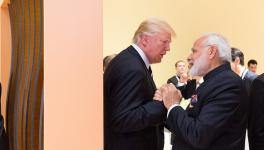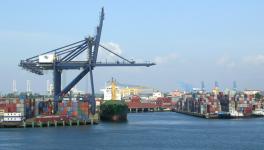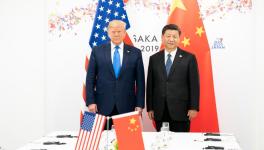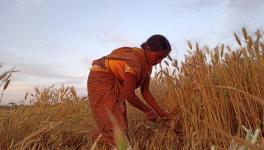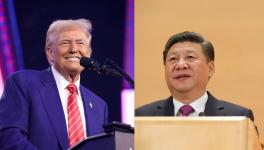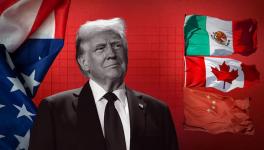WTO: Balance against the Developing World
Martin Khor of South Centre, Geneva, speaks to Newsclick about World Trade Organization and implication of its policies for the developing world.
Rough Transcript
Prabir Purkayastha (Prabir): Hello and welcome to Newsclick. Today we have with us Mr. Martin Khor who heads the South Centre in Geneva and who is very well known to private activist, climate activist, WTO activist for the kind of work he has done and the trade negotiations earlier now in climate negotiations. Martin, good to have you back with us.
Martin Khor (Martin): Very good to be here.
Prabir: Martin where do you think WTO negotiations are going. The minute we had the development round, it seems that the development is not on the agenda, the negotiations are collapsing.
Martin: Well, it is very clear that we will not be able to conclude this Doha negotiations this year or next year because the developed and developing countries are now seeping in a very different way. I think the developed countries led by the United States also by the European Union they have given up the pretense that this is something to do with development this round and they have made it not only a market access round but market access for their goods and services. Also at the same time they are sheltering their own important goods and this is something that this is very hard for the developing countries to take still they had agreed on some basic texts of December 2008 in which the imbalances are so greatly against the developing countries but even that was not acceptable to the United States now and they are making more and more demand especially of India and China. The demands really are to open up important industrial sectors including chemicals and pharmaceutical drugs who have zero tariff in these three sectors, industrial machinery, pharmaceutical drugs and chemicals and electronics plus further opening in agriculture and in many service sectors including financial services. So at this point I think correctly India has taken the lead among the two, three developing countries who came under this pressure to say that this is just not fair, we just cannot take this especially since India is hardly going to benefit at all. The demands that India has been making particularly in services you know that there will be stability in relation to their honouring, outsourcing to call centres and other services. The Indian demand that the Indian professionals will be able to enter the Unites States more easily and with a certain numbers this I am not being given.
Prabir: Of course in India, a lot of people would have seen the trade off as something as a trade off between helping a certain section who benefit from those agriculture and other activities. Leaving that issue, even that's not being accepted. But looking at the other picture, that the first round of WTO, ten years of WTO clearly shown that the countries that benefited really were western economies. Developed countries were those who were really benefited and this is supposed to redress that. So effectively, WTO still remains completely one sided against the interest of the developing countries.
Martin: It is one sided. The developing countries tried to change it by putting forward the hundred proposals by reforming WTO. India took the lead, Ambassador Narayanan is the father of that. I think he is now in Hyderabad. That was supposed to be the centre piece of this new round. But today, this whole thing has been passed aside and only the market access issues. You know that big countries China, India and other developing countries has now become the major demand, the major theme and we have been forced to take a very defensive position for e.g. India is one of the leaders of the group of the thirty three developing countries that have said that we need to protect our farmers and ourselves from import surges, cheap imports coming in overwhelming the livelihoods of the farmers and if this is going to happen, in future, you can raise your tariffs above the boundary in order to defend the farmer's livelihoods. This proposal has been accepted in principle but not in practice because in practice there are so many conditions put for this special facility that it is almost useless.
Prabir: It only protects a very small section of agricultural imports if the way the US, the western countries, the European Union argrue.
Martin: The conditions for using it so onerous that you can hardly make use of it. Not even for a narrow ban of products.
Prabir: This is one of the issue that concern both you and people like me who have been agitating on this for years. Effectively it has hit whole range of life saving drugs particularly for those who most need it. Those who can't really afford high cost drugs. That also has not been addressed in any significant way.
Martin: Well the Indian system you might say is the pride of the developing countries. You know the Indian drugs act of the 1970s that paved the way for you to you have a genetic industry which was hampered by the TRIPS agreement and only in 2005 you really have to implement it and we are now seeing the suffering of that implementation because many drug companies are so uncertain about whether they will be able to expand the number of drugs that they can produce because now they may need the compulsory license and so on. It is the right of India to have compulsory license and at the same time that may be challenged by powerful countries and the drug industry is not really knowing whether they will get compulsory license. May not want to factor in investments in future or something that may not appear. So I this this is the predominant effect that implications are only for India. That is implications in many countries in Africa, in Asia and so on, in Latin America that depend on cheap ad high quality genetics, my own country is Malaysia and the Malaysian government was the first to introduce compulsory licensing this was in 2004. That compulsory licensing was to import free HIV AIDS medicine from Cipla an Indian company from here. So in future, we are not so sure whether this companies will be producing new drugs. What is even more worrying for those of us who are watching the situation in India is the purchase of many Indian pharmaceutical companies by the multinational companies because it sends an element of uncertainty. We don't know whether the new owners will continue using this factories to produce low cost high quality drugs for the developing countries.
Prabir: To really look at the larger picture, the health costs whether it is US, whether it is European Union or a significant section of what is called welfare costs. Look at facts patented medicine, patented products, technologies are a major section of that. Do you think that there is really a possibility of getting north south movement across the board for actually weakening the patent regime in the world.
Martin: I think so even in United States there are many consumer groups and there are many people in the establishments too in the United States. Even the democrats who are controlling senate, they have taken a position that it is important to reduce cost of health care and the patents not only drive up the costs of health care but also prevent other companies doing up the research. There is a movement already even in a developed countries that are saying that the patent rights of the private holders have gone too far. The consumer rights and the private rights have to reassert themselves. There is in fact already a north south citizen's movement that has been operating quite effectively.
Prabir: Interesting enough, in the trade negotiations you get from the north from US particularly, far more regressive positions coming in on the question of patents.
Martin: Yes, because I think it comes balance of power and so on, the big companies still are able to have greater influence over the government than this underlying force that is emerging but one very interesting thing is that Obama administration at least the Attorney General's office themselves have taken a position that Unites States should not run patents for human genes because this of course has been a very major set back. The supreme court made the decision that even naturally occurring genes can be patented.
Prabir: That's an important milestones in that sense if that really goes through the court that do not come out with something else.
Martin: Unfortunately, during the appeal the court actually ruled that you can't patent the naturally occurring genes but this has been overturned.
Prabir: Thank you Martin. We will come back to this issue as the things seems unfold but as it appears the WTO negotiations seem to be deadlocked that it doesn't seem this round is really going anyway.
Martin: Thank you Prabir. Thank you Newsclick.
Get the latest reports & analysis with people's perspective on Protests, movements & deep analytical videos, discussions of the current affairs in your Telegram app. Subscribe to NewsClick's Telegram channel & get Real-Time updates on stories, as they get published on our website.











